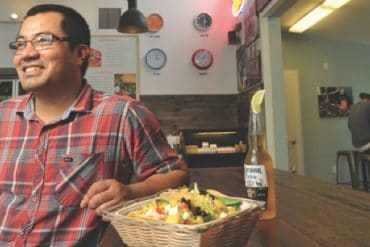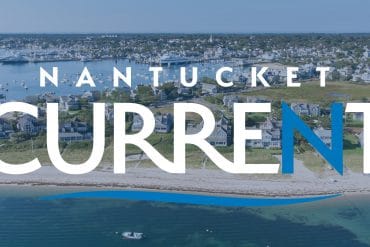 Even on an island, Todd Leftwich is a pretty tough guy to track down. The top purveyor of gourmet mushrooms on Nantucket, Leftwich’s public sightings are as rare as some of his mushrooms. So after several unreturned phone calls, I decided to drop by his mushroom lab behind the barn at Moors End Farm to see if I could catch him at work. With his door unlocked, I found Leftwich in the back, quietly sharing a pot of coffee with one of his students. He apologized for not calling me back, but confessed that he’s wary of the spotlight. “I don’t feel very interview-able right now,” he said. Still, he agreed to a conversation, and the next morning we sat down across from each other at his lab table.
Even on an island, Todd Leftwich is a pretty tough guy to track down. The top purveyor of gourmet mushrooms on Nantucket, Leftwich’s public sightings are as rare as some of his mushrooms. So after several unreturned phone calls, I decided to drop by his mushroom lab behind the barn at Moors End Farm to see if I could catch him at work. With his door unlocked, I found Leftwich in the back, quietly sharing a pot of coffee with one of his students. He apologized for not calling me back, but confessed that he’s wary of the spotlight. “I don’t feel very interview-able right now,” he said. Still, he agreed to a conversation, and the next morning we sat down across from each other at his lab table.
Leftwich is dressed casually in a t-shirt and jeans. His lab is bright, shelves crowded with glass beakers, graduated cylinders, and plastic bags filled with wood shavings coated in mycelium. Each bag will produce clusters of gourmet mushrooms—oysters, shiitake, hedgehogs, and lion’s manes—as well as medicinal varieties used for increasing blood flow and as a holistic cancer treatment. His mushrooms are sold exclusively at the Moors End summer farmstead, and it’s first-come, first-served. Leftwich sells out every day.
Originally from Colorado, Leftwich found his way to Nantucket in the early eighties and launched Nantucket Mushrooms in 2007. Even within the obscure world of gourmet mushrooms his work is unusual. Most growers order strains from other labs, but Leftwich propagates his own designer varieties that he nurtures to grow in unique shapes and colors. Mycology is not just a science for Leftwich—it’s also an art form.
Bursting with Latin names and technical details, Leftwich gives me a crash course in the fungi kingdom, and I can hardly keep up. “It’s on us, it’s in us, it’s everywhere,” he says. “There’s not a day in your life that you don’t interact with fungi.” Some types of fungi, he tells me, grow on our skin and in our bodies, while others grow in forests, dunes, deserts, even the deep ocean. Scientists have discovered less than a tenth of total estimated species of fungi, and if you want a specific number, you’ll get a laughably broad range. Kew Botanical Gardens says there could be between 700,000 and five million species in the world. We just don’t know.
Leftwich’s vast mushroom knowledge is entirely self-taught. A high school dropout, by his early twenties, he was studying mycology independently, fashioning an improvised lab out of recycled glassware. Today, his work has caught the eye of mycologists around the globe. “It’s kind of like having a cult following,” he says. Leftwich serves as a consultant for those building their own spawn labs, and he sells his designer strains to other growers.
He collects most of his strains from the wild, many from Nantucket. The island’s ecosystem is unique, seated above a fragile aquifer. “Some of the most choice gourmet edible mush- rooms grow here,” he says, “and some of the most poisonous.” (And, yes, Nantucket also has hallucinogenic “magic mushrooms,” but Leftwich doesn’t grow them.) Some mush- rooms, like morels, Leftwich’s particular favorite, are impossible to cultivate in his lab, and so he goes out hunting for them around the island. “Those are the places I don’t tell people about…my stash!” he laughs.
Leftwich is a big picture kind of guy. He relates every part of his work to the state of the global environment, especially to climate change. He wants to spread awareness, which is partly why he offers mycology courses to the Nantucket community. “I don’t care if you want to grow poisonous, gourmet, or hallucinogenic,” he says, “as long as you understand its role in nature.” Leftwich’s eight- week class is free, but there’s a long waitlist, so I’m delighted when he invites me to attend a session later that day.
When I return that afternoon, Leftwich greets me with a cheerful, “He-ey!” He’s visibly at ease, confidently moving between lab table and ventilation hood. He lays out a dozen bags of wood chips, a blend of oak and poplar sawdust fortified with recycled coffee grounds. The class is preparing to mix inoculated rye grain into the bags, where the mycelium will establish itself and, after a few weeks, bloom.
As I approach the table, Leftwich hands me a list of species and invites me to pick one. I tell him I like shiitakes. “Oh, yeah!” he exclaims. “We’ll get you growing ‘em.” He opens a few containers for me to sniff, explaining that every type of fungi smells unique. I take a whiff, and he’s right: bricktops are subtle and earthy, while golden oysters are lighter, with tones of citrus and even honey.
Although Leftwich doesn’t charge for his classes, he asks his students to participate in his side project, a bioremediation study. Some fungi are excellent absorbers of toxins, and can glean heavy metals, nitrates, and even petroleum from contaminated soil. Leftwich and his friend Frank Dutra, a local naturalist, are conducting trials on water samples from Consue Springs, the duck pond by the harbor. The area is severely polluted with heavy metals, and they’re hoping that their project can help restore the wetland.
Cleaning up Nantucket’s wetlands isn’t Leftwich’s only side project. He’s also starting another business on Cape Cod, a mushroom farm in Harwich, with his business partner Wes Price, leader of the Cape Cod Mushroom Club. They plan to ship mushrooms across the Cape and to high-end restaurants in Boston. But not to worry, even though Nantucket Mushrooms is expanding to the Cape, Leftwich will continue to have a presence on island—at least for this summer, mushroom lovers can still buy his products at the Moors End farm stand. Plus, his lab is still here, and his door is always open. “I’m not the person who goes to the cocktail parties and mingles,” he says. “I’m the guy in the lab.”
As class wraps up and I start to leave, Leftwich stops me to press a bag of wood chips and mycelium into my arms. “They’re golden oyster mushrooms,” he tells me, “and they’re about to pop.”




